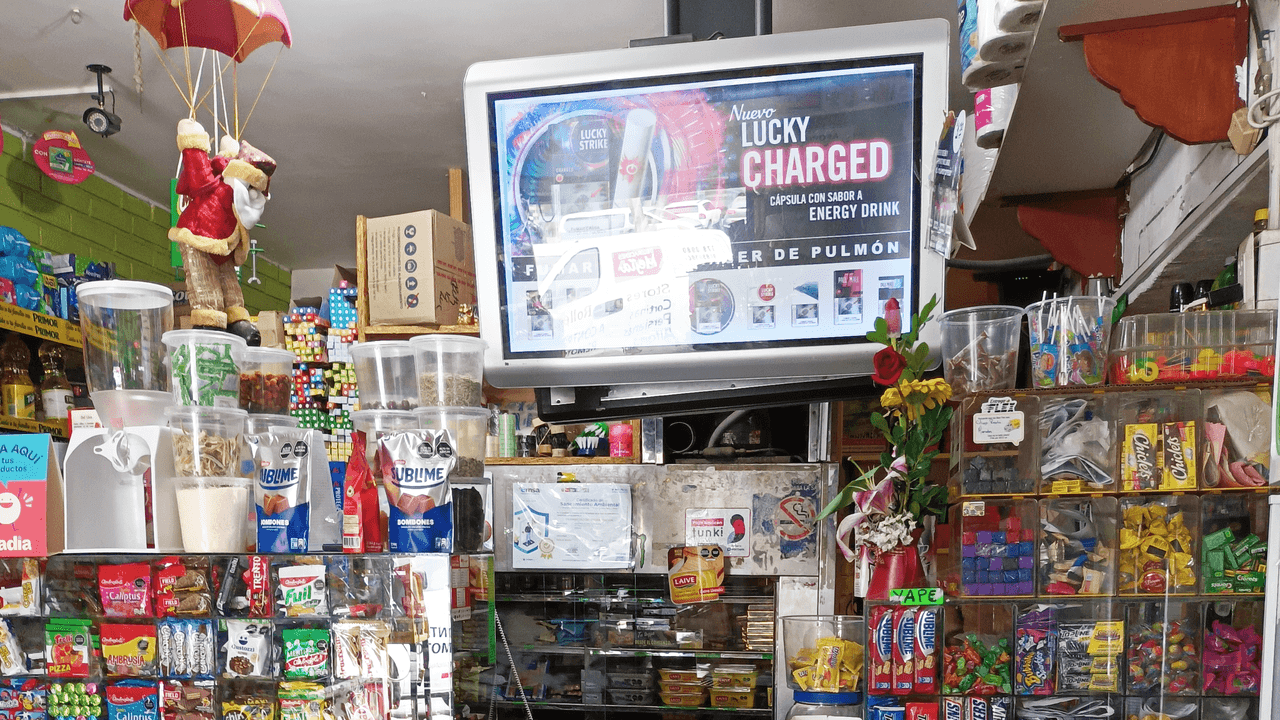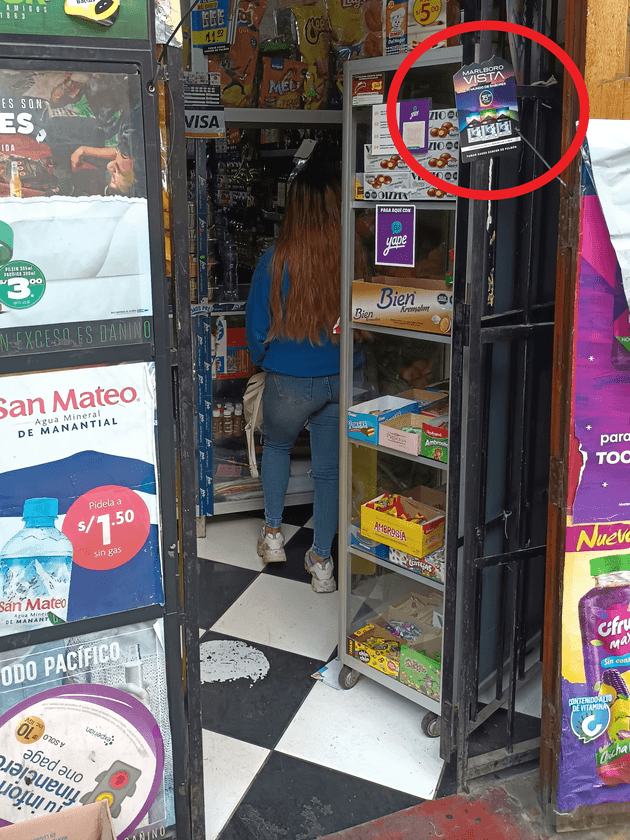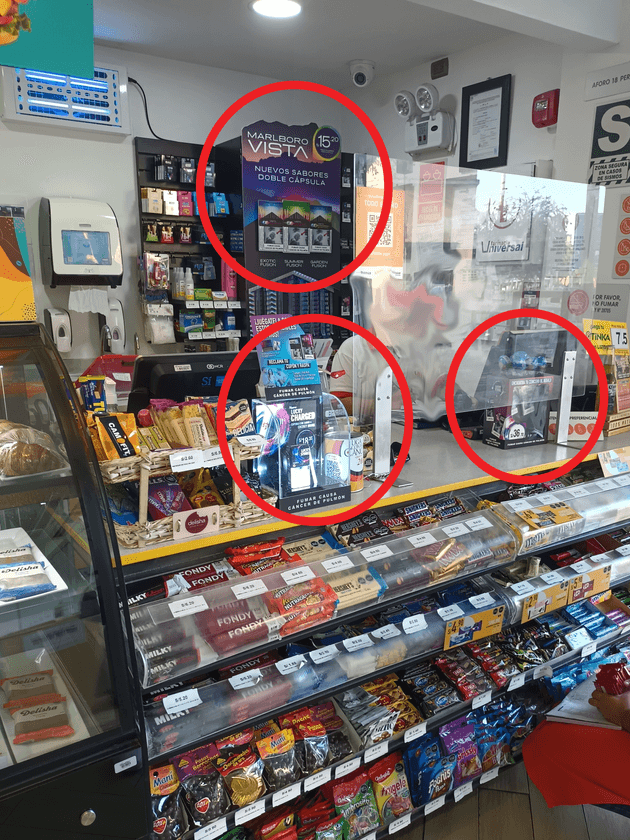
Big Tobacco firms advertising on schools’ doorsteps
Two of the world’s biggest tobacco companies are advertising flavoured cigarettes close to schools and in nearby corner shops in Peru, a joint investigation by the Bureau and OjoPúblico can reveal.
An advert for Marlboro cigarettes promising “un mundo de sabores” (a world of flavours) was found on display in the doorway of a shop opposite a school in Lima, while an energy drink-flavoured cigarette brand recently launched by British American Tobacco (BAT) was being advertised inside a shop less than 100 metres from the gates of another school in Peru’s capital.
It is illegal in Peru to advertise tobacco products within 500 metres of a school, but the law only covers adverts displayed outside. Campaigners have described this sort of promotion as exploiting the legal “loophole” that allows advertising around schools as long as it is not outside.
Flavoured tobacco products have been shown by studies to appeal particularly to young people and in many countries they are banned from being sold altogether. Philip Morris International (PMI) – which manufactures Marlboro – says it is on a mission to “unsmoke the world” as it morphs into a “healthcare and wellness” company.
Cigarettes are also being displayed next to sweets and snacks, and at children’s eye level, in corner shops close to schools in Lima. In a shop one block away from a school, BAT’s Lucky Strike cigarettes were seen on display either side of the cashier, including below Peppa Pig confectionery.
“If you ban advertising and allow some exceptions, it is very likely that the industry will take advantage of those exceptions and exploit them to the fullest to be able to advertise in a super open and targeted way to young people to find more audiences,” said Gianella Severini of the Campaign for Tobacco-Free Kids.
Promoting tobacco products close to the till, known as “point-of-sale marketing”, remains legal in many Latin American countries, including Peru, despite the World Health Organization’s Framework Convention on Tobacco Control recommending a total ban on tobacco advertising.
“You should not be able to advertise a product that is killing humanity: eight million people die every year,” said Jaime Delgado, president of the Peruvian Association of Consumers and Users. He added that tobacco kills more people each year than Covid-19.
Delgado said companies have tended to concentrate their advertising at points of sale: “In our country, bodegas [small corner stores] are the most abundant points of sale; we have more than 500,000 bodegas nationwide. There are no neighbourhoods where there is not a bodega.”
 Marlboro Vista cigarettes advertised in the doorway of a shop across the road from a school
Marlboro Vista cigarettes advertised in the doorway of a shop across the road from a school
 Lucky Strike's energy drink-flavoured cigarettes on display either side of the cashier including below Peppa Pig sweets, while Marlboro cigarettes are advertised behind the till
Lucky Strike's energy drink-flavoured cigarettes on display either side of the cashier including below Peppa Pig sweets, while Marlboro cigarettes are advertised behind the till
According to data published by the Peruvian government in 2017, the average age someone in the country starts smoking is 13.
Previous attempts to ban tobacco advertising in Peru have been met by resistance. “The tobacco industry unleashed its entire arsenal of influence and lobbying to prevent advertising from being prohibited,” said Delgado, who proposed the first initiative in 2011.
A 2020 investigation by the Bureau found that PMI was advertising cigarettes outside of schools in Indonesia. Afterwards, the company said that it does not permit outdoor advertising for its cigarette brands within 100 metres of schools.
A BAT spokesperson told the Bureau that its products and marketing are not designed to “engage or appeal to" those who are underage, in accordance with its internal guidelines, local laws and legislation. “We are clear to retailers that our products are for adults only,” they said.
A PMI spokesperson said that the company “is clear that youth should not use any tobacco or nicotine-containing product” and works “to prevent our marketing and products reaching this audience”.
They added: “We engage with a wide group of stakeholders on this issue, including independent retailers and governments. We monitor compliance – including from third party vendors – and report publicly on our progress annually.”
When shown the findings, they said: “PMI investigates all potential breaches of our global marketing practices and if verified we will ensure corrective action is taken.”
Additional reporting by Xilena Pinedo
Header image: BAT's new energy drink-flavoured cigarettes advertised behind the till in a corner shop near a school.
Reporter: Matthew Chapman
Impact producer: Paul Eccles
Global health editor: Chrissie Giles
Global editor: James Ball
Editor: Meirion Jones
Production editor: Alex Hess
Fact checker: Simon Lock
Legal team: Stephen Shotnes (Simons Muirhead Burton)
Our reporting on tobacco is part of our Global Health project, which has a number of funders. Our Big Tobacco project is funded by Vital Strategies. None of our funders have any influence over the Bureau’s editorial decisions or output.
-
Area:
-
Subject:





